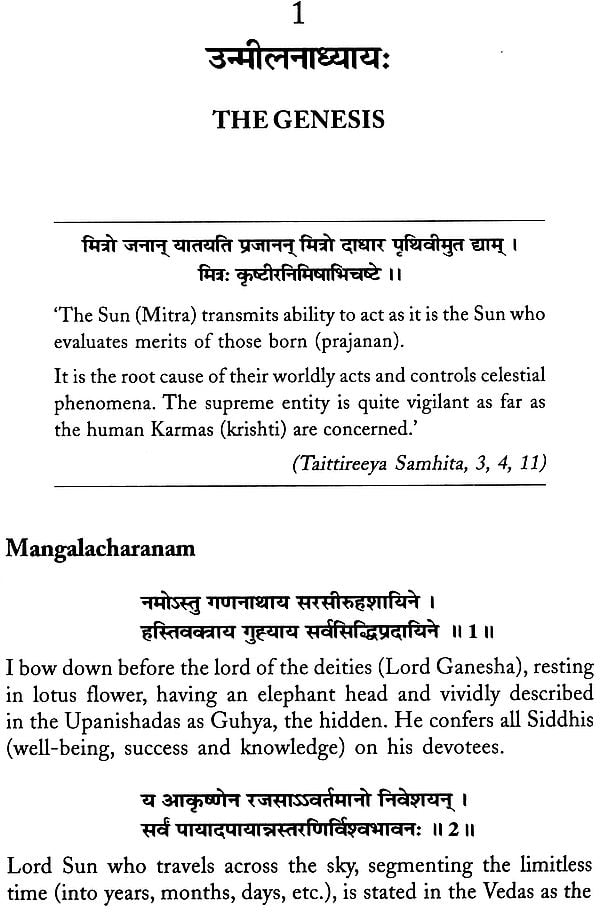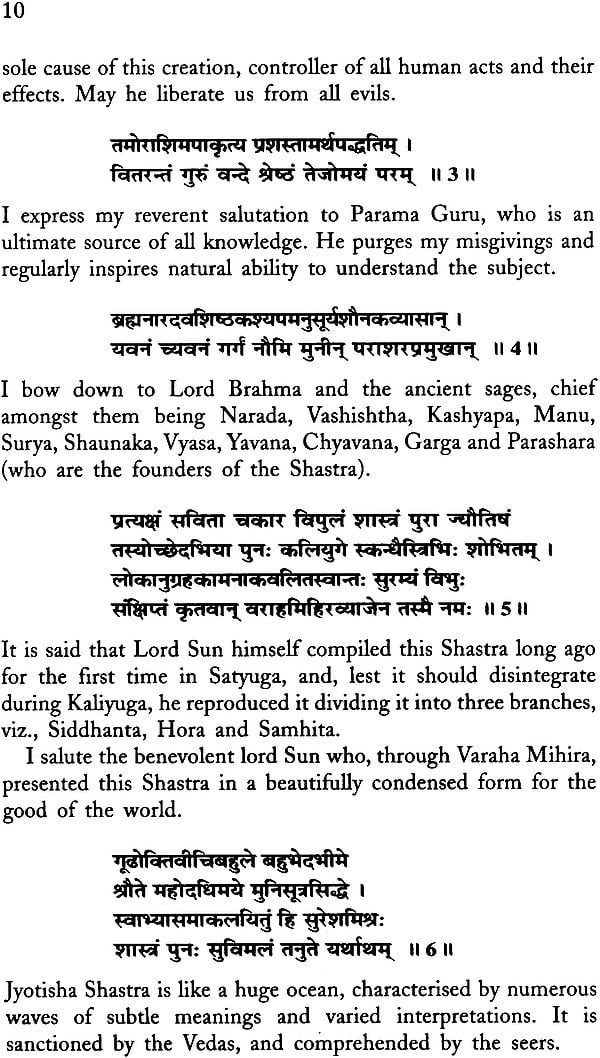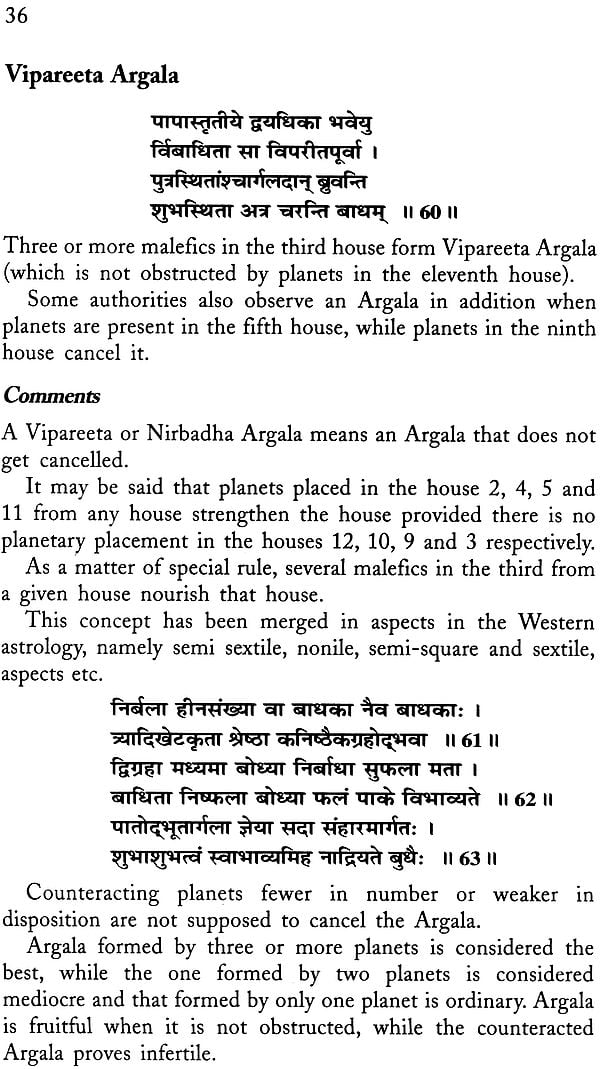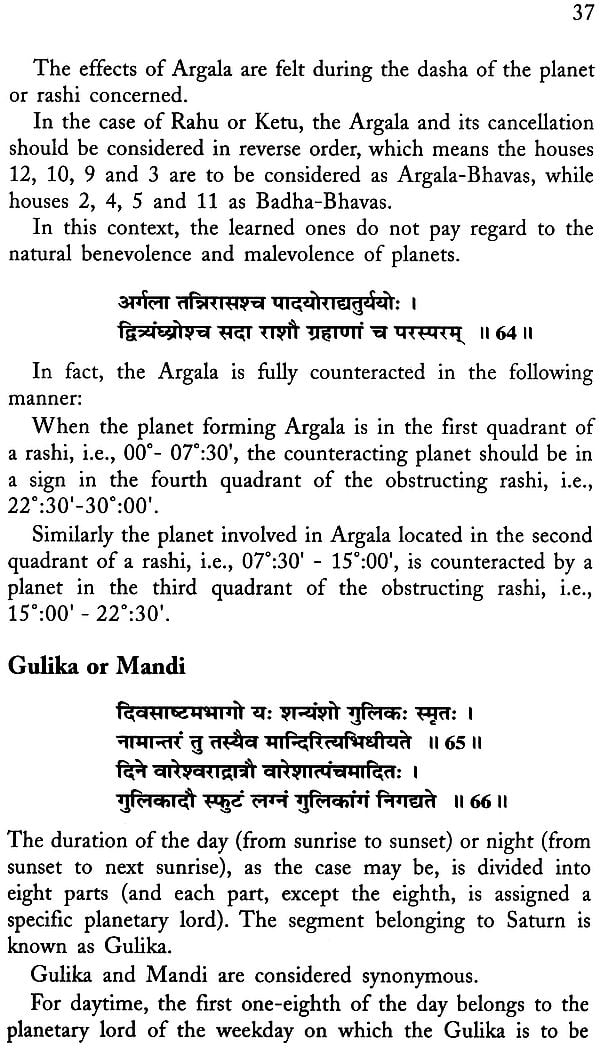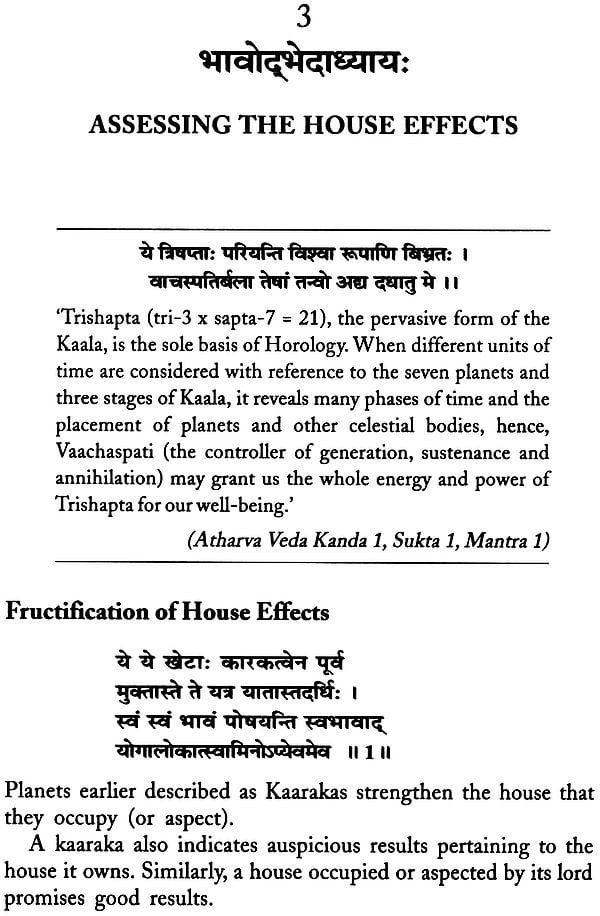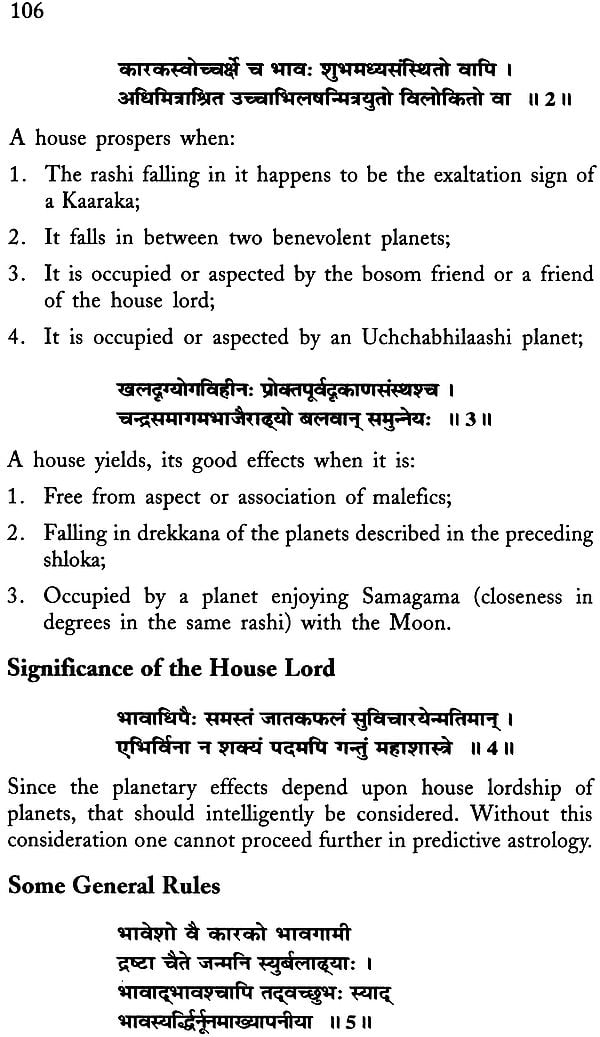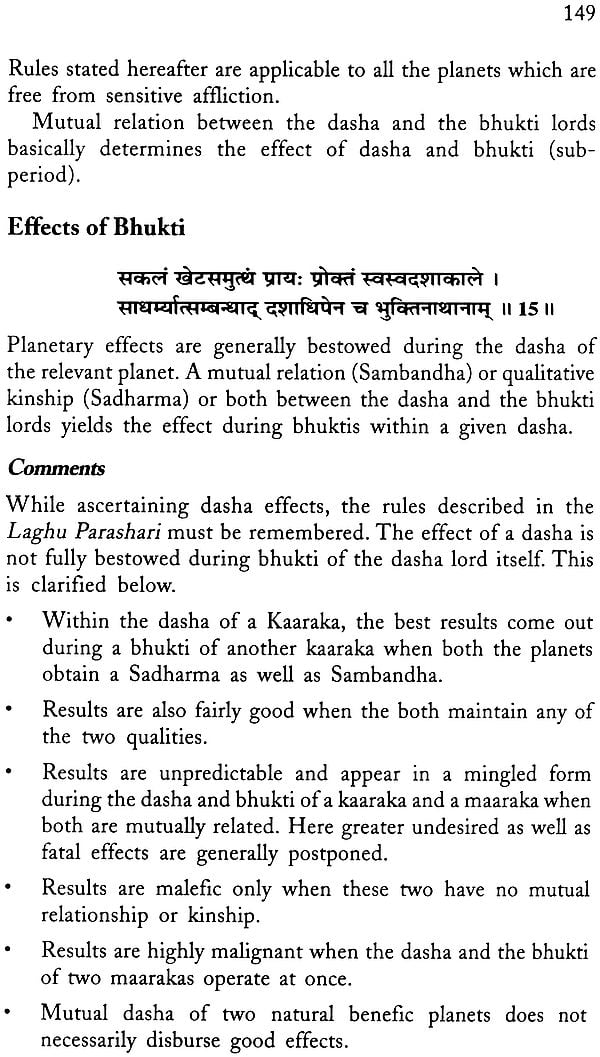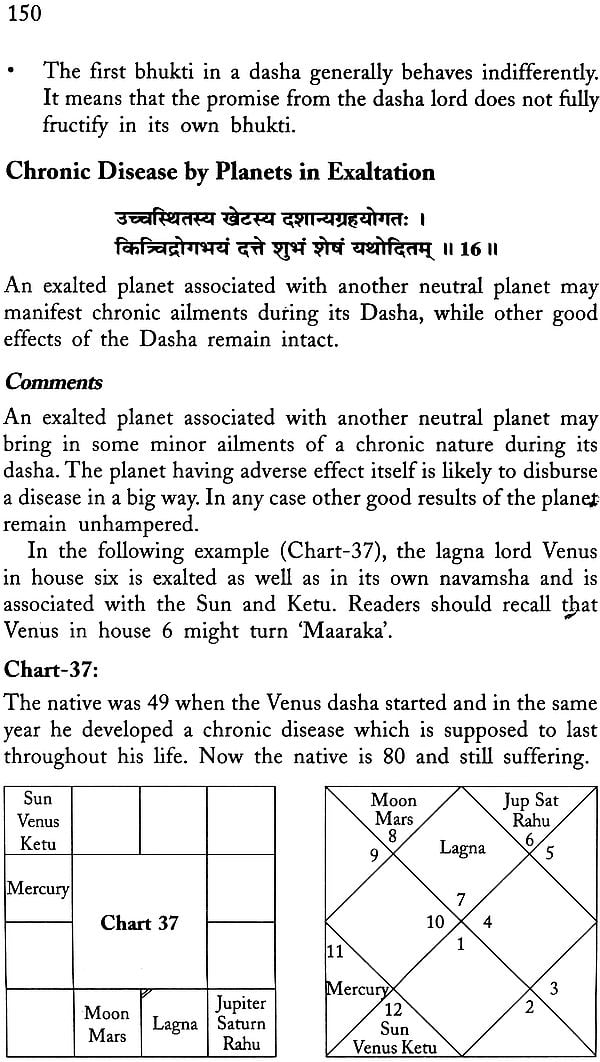
Panchadhyayee (A Compendium of Predictive Astrology)
Book Specification
| Item Code: | IDJ653 |
| Author: | Dr. Suresh Chandra Mishra |
| Publisher: | Pranav Publication |
| Language: | Sanskrit Text with English Translations |
| Edition: | 2016 |
| ISBN: | 819028410X |
| Pages: | 194 |
| Cover: | Paperback |
| Other Details | 8.3" X 5.4" |
| Weight | 180 gm |
Book Description
About the Book
The 'Panchadhyayee' contains the real essence of classics and efficiently deals with many techniques that are not appropriately explained in the elementary works. It is equally useful for practitioners of Jyotisha as well as the researchers. The explanations given may be brief but they have vast implications for predictive work. The highlights of this work are: § Profusely illustrated with actual horoscopic charts collected over a practice of decades.
§ Fixing of special Kaarakas, highlighting their subtle dimensions and elaborate application.
§ The assessment of results pertaining to houses and timing of their fructification through dashas and transits explained with actual examples.
§ Quantum of dasha effects, in accordance with the classics, elaborated with some special techniques.
§ Particular emphasis laid on determining the direction in which the native may prosper.
§ Detailed account of Gulika and sub-planets, along with their utility in chart analysis.
§ Pitfalls in chart reading highlighted.
§ Mantras (with transliteration) included for propitiation of planets as recommended by sages Garga and Parashara.
Preface
The genesis of Vedic Astrology is inherent in the Vedas and is deciphered by the sages and seers. While there may be varied methods of interpretation of dicta of the sages, this in no way can alter the basic temperament and nature of the subject. It is there is the Upanishads that the truth is only truth, nothing else but truth, forever truth, even when it is expounded in different manners.
Therefore, we do not have any choice of methods in interpretation other that that handed down by the sages. There is no room for any sort of self-willed and autocratic manner of enunciation about comprehension of the subject.
This present composition by Dr. Suresh Chandra Mishra has been written according to the rules stipulated by sages, remaining within the prescribed limits, states the author.
Perhaps having translated and commented upon all major classics on the subject as well as the Vedanga Jyotisham of Lagadha (expounded around 1550 BC) in 2003, he aspired to customize a practical rule base for an easy chart analysis for the benefit of students of Vedic astrology that resulted in the present comprendium, viz., Panchadhyayee.
This concise work, having three hundred and thirty seven verses (Shlokas) in Sanskrit (excluding four of the concluding statements) contains the real essence of the classics.
The worth of this work lies in its accordance to the rules stated in astrological classics as well as in their systematic application.
This work is distributed in five chapters where the lagna, planets yielding benevolence, the effect of houses and rules for determination of the Dasha effects have methodically been described in a lucid manner. In the fifth chapter some miscellaneous essential points have been dealt with.
Aphorisms contained in the work are highly useful, authentic and are mainly based upon the principles of sage Parashara. The versification and the syntax of Sanskrit language used herein is pleasing and that has been presented in a manner where one can quickly recall the relevant rule applicable to a chart or even can learn them easily by heart. Every Shloka looks petite, speaks in brief, but reveals in details.
The work is primarily useful for those who seek efficiency in chart analysis. It provides a considerably vast and fertile ground for research orientation, hence useful for those too who want to pursue the astrological research. Many expressions in this work conceal vast meaning in their brevity. The work is equally useful for the novice as well as the expert and bridges the gap between the elementary writings on astrology and the great astrological classics.
It is a matter of great honour that Dr. Mishra permited me to translate the work in English language in order to make it more useful for one and all. I have taken support from his commentaries on astrological classics, write ups already published in Hindi with Sanskrit text, his articles in English and personal academic interactions with him. All these combined have encouraged me to write a commentary on his present work.
This commentary is profusely illustrated with actual horoscopic charts. Most of these I have taken from the personal collection of Dr. Suresh Mishra. I have seen him apply these rules on numerous occasions. I earnestly express my deep reverence to him, my father, my guru, and consider myself blessed that I have earned his confidence.
If this commentary proves useful to the seeker of astrological wisdom, the credit for it belongs to Dr. Mishra. However, I honestly hold myself responsible for possible lapses that may have crept in. I also express my deep gratitude to Dr. K.S. Charak, editor of the Vedic Astrology magazine, for his valuable suggestions and help during the completion of the commentary.
In the Vedic culture, it is believed that every human being is indebted to gods, rishis and progenitors (i.e., three kinds of debt known as Deva Rina, Rishi Rina and Pitri Rina). This humble effort may be taken as my sincere effort for repaying some of the Rishi Rina that I naturally owe.
| Preface | 5 | |
| 1. | Unmeelana Adhyaya (The Genesis) | 9 |
| Mangalacharanam; ascertaining the birth time; sensitve points at birth; what is lagna? Significance of Bhava Sphuta; special lagans: Hora, Bhava, Ghati and Vighati lagans; recognizing the strength of a rashi; Varnada dasha; Argala; Gulika or Mandi; Praanapada; other sub-planets; common rules; Drishti: planetry aspects; Drishti in other charts; lagna; a subtle entity; Ayanamsha; Chitra Paksha: the Vedic ayanamsha. Ayana-Gati; other ayanamshas. | ||
| 2. | Kaaraka Adhyaya (Benevolent Planets) | 52 |
| Fixation of the yoga kaaraka; beneficence and maleficence of planets; kaaraka from the lordship; the Kendra lords; Rahu and Ketu; Aatma kaaraka (AK); Chara kaarakas; alternate karakas; debilitated planets; combust planets; soothing planets; retrograde planets; planetary relations (Sambandha); key words for the karakas; some special karakas; Moon in Krittika; of the Moon and Mars; waning Moon; nakshatras of the Moon and Mars; planets in kendras; benevolence in general; evaluation of the chart at a glance; the yogas; Aakriti yogas; Dala; Ashraya and Samkhya yogas; brief description of Nabhasa yogas; Maha-purusha yogas; brief description of Nabhasa yogas; Maha-purusha yogas; Maaraka: the planets of distress; special maarakas; Mrityu bhagas; some other parameters; domain of a maaraka. | ||
| 3. | Bhavodbheda Adhyaya | 105 |
| Fructification of house effects; significance of the house lord; some general rules; strength of a house; Bhadra panchaka; lagna and labha lords; natural malefics; Trika lords; declining benevolence; the Vainashika: nakshatra of subversion; Venus in the twelfth house; other special rules; Badhaka (obstruent) houses and planets; special rules for dual lordship; nakshatra hammed between malefics; special rules of house effects; pitfalls in assessing the house; Adhomukha and Samhara nakshatras; Jala vriddhi and Jala kshaya; Tithi in houses; significance of Nisarga bala; of samuday ashtakavarga; timing of the results; negative effects of houses; other parameters; resulting pattern of planets. | ||
| 4. | Dashapahara Adhyaya(Determination of Dasha Effects) | 138 |
| Significance of Vimshottari dasha; fixation of the dasha end; basis of dasha; fundamentals of dasha effects; dasha of a yoga kaaraka; behavior of the dasha lord; quotes from Parashara; effects of bhukti; chronic disease, by exalted planets; dasha lord with Jupiter or the ninth lord; yoga kaaraka: quantum of results; dasha of a retrograde planet; relative placement of dasha and bhukti lords; dasha of a Trika lord; dasha and planetary transit; dasha effects from Ashtakavarga; dashas of distress; some special rules; dasha effects: a special technique. | ||
| 5. | Mishra Adhyaya (Miscellaneous) | 164 |
| The Sudarshana Chakra; method of analysis; dasha effects from Awasthas; results of the Awasthas; dasha effects from Vaahana (vehicle); the benefic direction; about profession; mitigating the evil; concluding statement. | ||
| Appendix (Mantras for Propitiation) | 183 |
S
